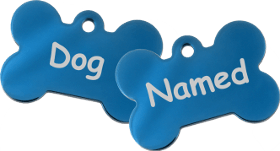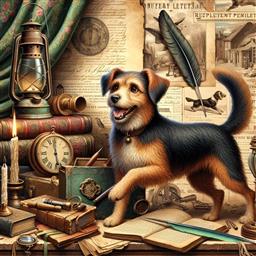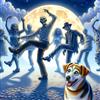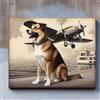1860s Dog Names - Page 5
Updated: June 01, 2024
Welcome to a unique collection of canine appellations inspired by an era steeped in history and transformation. The 1860s, a significant decade marked by events such as the American Civil War and the Industrial Revolution, has a distinctive charm that resonates even in the realm of pet naming. This page offers a compilation of names popular during this period of time.
These monikers draw from various inspirations prevalent during the 19th century. Some are influenced by prominent figures of the time, while others are taken from popular culture, literature, and even common occupations of the age. This rich tapestry of names offers a unique opportunity for pet owners who wish to bestow upon their pets a name with historical significance.
So, if you are a history buff or simply someone on the lookout for a unique and meaningful name for your furry friend, then our selection is sure to intrigue you. Let's travel back in time and explore the charm and character of the 1860s through these distinctive dog names.
| Name | Reason to Choose |
|---|---|
| Wendell | Wendell, an English name, was common in the 1860s |
| Whitney | Given the prevalence of this name during the 1860s, it would have been a suitable dog name |
| Wilfred | Wilfred was a common name in England during the 1860s |
| Wilhelmina | This female name was popular in the 19th century |
| Xander | Short for Alexander, a common name in the 1860s |
| Xanthe | A Greek name meaning 'golden', Xanthe was used in the 19th century |
| Xavier | A common Victorian era name |
| Xenia | Although rare, this name was used during the 1860s, making it a unique choice for a dog |
| Xerxes | Named after the Persian king, Xerxes was a common male name |
| Yancy | A common name during the Civil War era |
| Yolanda | Yolanda, a Spanish name, was common in the 1860s |
| York | This was a common name for men during the 1860s, making it a possible name for a dog |
| Yvette | A popular French name, Yvette was common in the 1860s |
| Yvonne | This female name was popular during the 19th century |
| Zachariah | This Biblical name was common during the Victorian era |
| Zeb | Short for Zebulon, a Victorian era name |
| Zeke | Short for Ezekiel, a popular name in the 1860s |
| Zelda | Given its usage among women during the 1860s, the name would have been used for dogs |
| Zephyr | Derived from Greek, Zephyr was a common male name during the 19th century |
|
Suggest:
|
Submitted!
|
| 1 2 3 4 5 | |
1860s Popular Dog Breeds
| Name | Description |
|---|---|
| Albert | Named after Prince Albert, it was common for Victorian-era dogs, including English Setters |
| Belle | A favorite for female dogs of the 1860s, particularly for Basset Hounds |
| Buster | A popular name for dogs in the 1860s, especially for breeds like the Beagle |
| Charlie | A common choice for male dogs of various breeds in the 1860s |
| Daisy | A favorite for female dogs, especially for breeds like the Pomeranian |
| Duke | A common choice for male dogs of various breeds in the 1860s |
| Harry | A popular choice for male dogs in the 1860s, especially for breeds like the Gordon Setter |
| Jack | Popular for male dogs in the 1860s, particularly for breeds like the Bulldog |
| Jenny | A common name in the 1860s for female dogs, especially those of the Spaniel breed |
| Lily | A common name in the 1860s for female dogs, especially those of the Saint Bernard breed |
| Lola | A popular choice in the 1860s for female dogs, especially for breeds like the Borzoi |
| Lucy | A common name in the 1860s for female dogs, especially those of the Mastiff breed |
| Maggie | A favorite for female dogs, especially for breeds like the Pointer |
| Max | Popular for male dogs in the 1860s, especially for breeds like the Boxer |
| Millie | A popular choice in the 1860s for female dogs, especially for breeds like the Terrier |
| Molly | A favorite for female dogs, particularly for breeds like the Greyhound |
| Oliver | Popular for male dogs in the 1860s, especially for breeds like the Foxhound |
| Oscar | A popular choice for male dogs in the 1860s, particularly for breeds like the Dalmatian |
| Rosie | A popular choice in the 1860s for female dogs, especially for breeds like the Collie |
| Ruby | A favorite for female dogs, especially for breeds like the Retriever |
| Rufus | Commonly given to ruddy-colored dogs like Irish Setters during the 1860s |
| Sadie | A favorite for female dogs, particularly for breeds like the Poodle |
| Sam | Commonly given to male dogs like the Bloodhound in the 1860s |
| Teddy | Commonly given to fluffy dogs like the Newfoundland in the 1860s |
| Toby | A common choice for male dogs of various breeds in the 1860s |
|
Suggest:
|
Submitted!
|
Historical Figures of the 1860s
| Name | Description |
|---|---|
| Bismarck | For Otto von Bismarck, a key figure in the unification of Germany |
| Booth | Referencing John Wilkes Booth, the infamous assassin of President Lincoln |
| Burnside | For Ambrose Burnside, a Union Army general in the Civil War |
| Carson | An homage to Kit Carson, an American frontiersman and soldier in the 1860s |
| Clara | In remembrance of Clara Barton, founder of the American Red Cross |
| Custer | Inspired by George Armstrong Custer, a United States Army officer and cavalry commander |
| Dickens | From Charles Dickens, a prominent writer of the period |
| Fredrick | After Frederick Douglass, an influential African-American abolitionist |
| Garibaldi | For Giuseppe Garibaldi, who played a major role in the unification of Italy |
| Grant | Named after Ulysses S. Grant, who led the Union Army to victory during the Civil War |
| Jefferson | A nod to Jefferson Davis, the President of the Confederate States during the Civil War |
| Lee | After Robert E. Lee, the commanding general of the Confederate Army |
| Lincoln | In honor of Abraham Lincoln, the 16th President of the United States who served during the 1860s |
| Maximilian | After Maximilian I, the only monarch of the Second Mexican Empire |
| Pasteur | Named after Louis Pasteur, a leading scientist known for his discoveries in the field of microbiology |
| Seward | Named for William H. Seward, Secretary of State under Lincoln |
| Sherman | A moniker inspired by William Tecumseh Sherman, a Union General in the American Civil War |
| Stonewall | Paying tribute to Stonewall Jackson, a notable general in the Confederate Army |
| Stuart | For J.E.B. Stuart, a Confederate Army general known for his cavalry tactics |
| Sumner | Named for Charles Sumner, a leading abolitionist senator |
| Thaddeus | In honor of Thaddeus Stevens, a radical Republican leader in the U.S. House of Representatives |
| Tolstoy | A nod to Leo Tolstoy, who published War and Peace in the 1860s |
| Victoria | A tribute to Queen Victoria, who reigned over the United Kingdom during this period |
| Welles | After Gideon Welles, the United States Secretary of the Navy during the Civil War |
| Whitman | A tribute to Walt Whitman, a renowned American poet and essayist whose work was prominent during the 1860s |
|
Suggest:
|
Submitted!
|
Literary Names of the 1860s
| Name | Description |
|---|---|
| Bennett | From the Bennett sisters in 'Pride and Prejudice', a novel by Jane Austen |
| Bumble | Taken from the character Mr. Bumble in 'Oliver Twist' by Charles Dickens |
| Chillingworth | Inspired by Roger Chillingworth, a character in 'The Scarlet Letter' |
| Copperfield | After the character David Copperfield in the novel by Charles Dickens |
| Cosette | Inspired by the character Cosette in Victor Hugo's 'Les Misérables' |
| Darcy | After Mr. Darcy, a character in 'Pride and Prejudice' |
| Dimmesdale | Taken from the character Arthur Dimmesdale in 'The Scarlet Letter' |
| Estella | Derived from Charles Dickens' 'Great Expectations' published in 1861 |
| Eyre | From the title character of Charlotte Brontë's 'Jane Eyre' |
| Gulliver | Inspired by Jonathan Swift's 'Gulliver's Travels' |
| Havisham | From the character Miss Havisham, a character in 'Great Expectations' |
| Heathcliff | After the protagonist from Emily Bronte's 'Wuthering Heights', published in the 1840s |
| Hester | From the character Hester Prynne in Nathaniel Hawthorne's 'The Scarlet Letter' |
| Huckleberry | Inspired by Mark Twain's character, Huckleberry Finn |
| Hyde | Taken from the character Edward Hyde in Robert Louis Stevenson's 'Strange Case of Dr Jekyll and Mr Hyde' |
| Ishmael | Taken from the protagonist in Herman Melville's 'Moby-Dick' |
| Jekyll | Inspired by Dr Henry Jekyll, a character in 'Strange Case of Dr Jekyll and Mr Hyde' |
| Micawber | Inspired by Wilkins Micawber, a character in 'David Copperfield' |
| Nemo | From Captain Nemo, a character in 'Twenty Thousand Leagues Under the Sea' by Jules Verne |
| Passepartout | From the character Jean Passepartout in Jules Verne's 'Around the World in Eighty Days' |
| Phileas | Inspired by Phileas Fogg, the protagonist in Jules Verne's 'Around the World in Eighty Days' |
| Pip | The main character in 'Great Expectations' by Charles Dickens |
| Queequeg | From the character Queequeg in Herman Melville's 'Moby-Dick' |
| Rochester | Inspired by the character Edward Rochester from 'Jane Eyre' by Charlotte Brontë |
| Scrooge | Taken from Ebenezer Scrooge, the main character in Charles Dickens' 'A Christmas Carol' |
|
Suggest:
|
Submitted!
|
Victorian Era Names
| Name | Description |
|---|---|
| Albert | Inspired by Prince Albert, Queen Victoria's husband |
| Alfred | In honor of Alfred Tennyson, the Poet Laureate of the United Kingdom during much of Queen Victoria's reign |
| Arthur | Named after Arthur Wellesley, 1st Duke of Wellington, a popular figure in the Victorian era |
| Bertha | A character's name from the popular novel Jane Eyre, published during Queen Victoria's reign |
| Charles | Named for Charles Dickens, one of the most well-known authors of the era |
| Clara | A common woman's name in the 1860s |
| Edgar | The famed poet Edgar Allan Poe was a contemporary of the Victorian era |
| Edward | Edward was a common name for men in the Victorian era |
| Elizabeth | An homage to Elizabeth Gaskell, a celebrated author of the time |
| Emma | A popular name for women during the Victorian period |
| Florence | In honor of Florence Nightingale, iconic nurse of the Victorian period |
| George | A nod to George Eliot, a famous author of the period |
| Harriet | Inspired by Harriet Beecher Stowe, author of Uncle Tom's Cabin, published in the 1860s |
| Henry | In honor of Henry James, a famous author of the period |
| Louisa | Inspired by Louisa May Alcott, author of Little Women, which was published during the Victorian era |
| Margaret | A common name for women during the Victorian times |
| Matilda | Matilda was a popular name for girls during the Victorian times |
| Oscar | Playwright Oscar Wilde was a prominent figure in the Victorian era |
| Robert | Named after Robert Browning, a well-known poet of the Victorian era |
| Theodore | Theodore was a Victorian-era name often associated with gentlemen |
| Thomas | A nod to Thomas Hardy, a famous author of the Victorian era |
| Victoria | A tribute to the reigning monarch of the time |
| Walter | Walter was a popular male name in the Victorian era |
| Wilfred | A popular gentleman's name during the Victorian period |
| William | A nod to William Makepeace Thackeray, a famous author of the period |
|
Suggest:
|
Submitted!
|
Civil War Inspired Names
| Name | Description |
|---|---|
| Anderson | After Andersonville, a notorious Confederate prisoner-of-war camp |
| Antietam | After the Battle of Antietam |
| Appomattox | Where the Civil War ended, at the Appomattox Court House |
| Belle | Inspired by Belle Boyd, a Confederate spy |
| Bluecoat | A nickname for the Union soldiers, based on their uniforms |
| Bullrun | In remembrance of the Battle of Bull Run |
| Cavalry | To honor the horse-riding soldiers of the Civil War era |
| Clara | To honor Clara Barton, founder of the American Red Cross |
| Confederate | Inspired by the Southern states seceding to form the Confederacy |
| Dixie | A nod to the nickname for the Southern states |
| Emancipation | Inspired by the Emancipation Proclamation |
| Frederick | Named after the great abolitionist, Frederick Douglass |
| Gettysburg | To remember the Battle of Gettysburg |
| Grant | Named after Ulysses S. Grant, a prominent Union general |
| Greyback | A nickname for Confederate soldiers, inspired by their attire |
| Harriet | In honor of Harriet Tubman, a famous abolitionist |
| Lee | Commemorates Robert E. Lee, the well-known Confederate general |
| Lincoln | In honor of Abraham Lincoln, the president during the Civil War |
| Rebel | A term often used for Confederate soldiers |
| Secession | Refers to the Southern states leaving the Union |
| Sherman | Inspired by William Tecumseh Sherman, a Union general |
| Stonewall | After Thomas 'Stonewall' Jackson, a Confederate general |
| Sumter | The Civil War started at Fort Sumter |
| Union | Representing the Northern states in the Civil War |
| Yankee | A common term used for Union soldiers |
|
Suggest:
|
Submitted!
|
User Submitted Images
There are currently no user submitted images for this page. This is your opportunity to be the first! Submit your photo below.
User Recommendations
There are currently no name recommendations for this page. This is your opportunity to be the first! Make your recommendation below.
Recently Updated
We would like to take this time to thank all of our visitors that make DogNamed.com the best dog naming resource on the web. Our site would not be where it is today without your suggestions, ratings, and photo submissions. So pat yourselves on the back for a job well done and keep up the good work! If you have any comments, suggestions, or ideas for the this page or any part of our site, don't hesitate to drop us a line on our Contact Page. Thank you! -The DogNamed Team




























